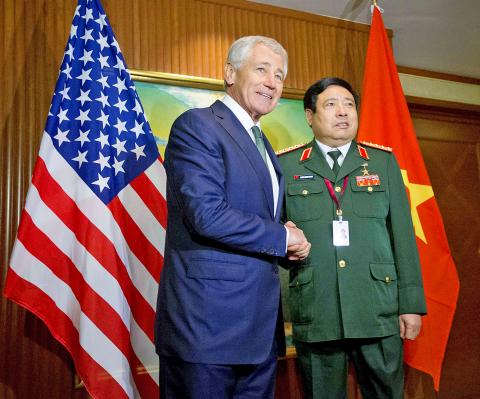The US and China squared off at an Asian security forum yesterday, with the US defense secretary accusing Beijing of destabilizing the region and a top Chinese general retorting that the comments were a “threat and intimidation.”
Using unusually strong language, US Secretary of Defense Chuck Hagel took aim at Beijing’s handling of territorial disputes with its Asian neighbors.
“In recent months, China has undertaken destabilizing, unilateral actions asserting its claims in the South China Sea,” Hagel said.

Photo: AFP
He warned Beijing that the US was committed to its geopolitical rebalance to the Asia-Pacific region and “will not look the other way when fundamental principles of the international order are being challenged.”
Hagel said the US took no position on the merits of rival territorial claims in the region, but added: “We firmly oppose any nation’s use of intimidation, coercion or the threat of force to assert these claims.”
His speech at Singapore’s Shangri-La Dialogue, Asia’s biggest security forum, provoked an angry reaction from the deputy chief of staff of the Chinese Army, Lieutenant-General Wang Guanzhong (王冠中).
“I felt that Secretary Hagel’s speech is full of hegemonism, threat and intimidation,” he told reporters just after the speech.
Wang said the speech was aimed at causing trouble in the Asia-Pacific.
Hagel’s comments followed the keynote address by Japanese Prime Minister Shinzo Abe at the same forum on Friday evening, who pledged “utmost support” to Southeast Asian countries, several of which are locked in maritime disputes with China.
“I felt that they were just trying to echo each other,” Wang said.
Hagel later held a bilateral meeting with Wang, where the Chinese military leader expressed his surprise at the US defense secretary’s speech.
“You were very candid this morning, and to be frank, more than our expectations,” he said. “Although I do think those criticisms are groundless, I do appreciate your candor, likewise we will also share our candor.”
A senior US defense official said that, despite Wang’s opening remarks, the tone of the meeting had been “businesslike and fairly amicable.”
While Hagel went over ground he covered in his speech, Wang spent most of the meeting talking about US-China military-to-military contacts, including Chinese participation in forthcoming military exercises, the official said.
Wang, China’s deputy chief of staff, also snubbed an offer for talks with Japan made by Japanese Minister of Defense Itsunori Onodera, the China News Service said.
“This will hinge on whether the Japanese side is willing to amend the erroneous policy towards China and improve relations between China and Japan,” he said. “Japan should correct its mistakes as soon as possible to improve China-Japan ties.”
“To ensure that the rebalance is fully implemented, both President Obama and I remain committed to ensuring that any reductions in US defense spending do not come at the expense of America’s commitments in the Asia-Pacific,” he said.

People can preregister to receive their NT$10,000 (US$325) cash distributed from the central government on Nov. 5 after President William Lai (賴清德) yesterday signed the Special Budget for Strengthening Economic, Social and National Security Resilience, the Executive Yuan told a news conference last night. The special budget, passed by the Legislative Yuan on Friday last week with a cash handout budget of NT$236 billion, was officially submitted to the Executive Yuan and the Presidential Office yesterday afternoon. People can register through the official Web site at https://10000.gov.tw to have the funds deposited into their bank accounts, withdraw the funds at automated teller

PEACE AND STABILITY: Maintaining the cross-strait ‘status quo’ has long been the government’s position, the Ministry of Foreign Affairs said Taiwan is committed to maintaining the cross-strait “status quo” and seeks no escalation of tensions, the Ministry of Foreign Affairs (MOFA) said yesterday, rebutting a Time magazine opinion piece that described President William Lai (賴清德) as a “reckless leader.” The article, titled “The US Must Beware of Taiwan’s Reckless Leader,” was written by Lyle Goldstein, director of the Asia Program at the Washington-based Defense Priorities think tank. Goldstein wrote that Taiwan is “the world’s most dangerous flashpoint” amid ongoing conflicts in the Middle East and Russia’s invasion of Ukraine. He said that the situation in the Taiwan Strait has become less stable

CONCESSION: A Shin Kong official said that the firm was ‘willing to contribute’ to the nation, as the move would enable Nvidia Crop to build its headquarters in Taiwan Shin Kong Life Insurance Co (新光人壽) yesterday said it would relinquish land-use rights, or known as surface rights, for two plots in Taipei’s Beitou District (北投), paving the way for Nvidia Corp to expand its office footprint in Taiwan. The insurer said it made the decision “in the interest of the nation’s greater good” and would not seek compensation from taxpayers for potential future losses, calling the move a gesture to resolve a months-long impasse among the insurer, the Taipei City Government and the US chip giant. “The decision was made on the condition that the Taipei City Government reimburses the related

FRESH LOOK: A committee would gather expert and public input on the themes and visual motifs that would appear on the notes, the central bank governor said The central bank has launched a comprehensive redesign of New Taiwan dollar banknotes to enhance anti-counterfeiting measures, improve accessibility and align the bills with global sustainability standards, Governor Yang Chin-long (楊金龍) told a meeting of the legislature’s Finance Committee yesterday. The overhaul would affect all five denominations — NT$100, NT$200, NT$500, NT$1,000 and NT$2,000 notes — but not coins, Yang said. It would be the first major update to the banknotes in 24 years, as the current series, introduced in 2001, has remained in circulation amid rapid advances in printing technology and security standards. “Updating the notes is essential to safeguard the integrity